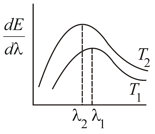Embibe Experts Solutions for Chapter: Heat Transfer, Exercise 5: Exercise (Analytical Questions)
Embibe Experts Physics Solutions for Exercise - Embibe Experts Solutions for Chapter: Heat Transfer, Exercise 5: Exercise (Analytical Questions)
Attempt the practice questions on Chapter 16: Heat Transfer, Exercise 5: Exercise (Analytical Questions) with hints and solutions to strengthen your understanding. Beta Question Bank for Medical: Physics solutions are prepared by Experienced Embibe Experts.
Questions from Embibe Experts Solutions for Chapter: Heat Transfer, Exercise 5: Exercise (Analytical Questions) with Hints & Solutions
Spheres are uniformly constructed from the same material which is a good conductor of heat and the radius of is thrice of radius of . The rate of fall of temperature of is times that of when both are at the same surface temperature. The value of is
A sphere, a cube and a thin circular plate all made of same substance and all have same mass, These are heated to and then placed in a room, then the
The power radiated by a black body is , and it radiates maximum energy around the wavelength . If the temperature of the black body is now changed, so that, it radiates maximum energy around a wavelength , the power radiated by it will increase by a factor of
A slab consists of two parallel layers of copper and brass of the same thickness and having thermal conductivities in the ratio . If the free face of brass is at and that of copper at , the temperature of interface is
Out of the metal balls of same diameter one is solid and other is hollow. Both are heated to the same temperature at and then allowed to cool in the same surroundings then rate of loss of heat will be
For a black body at temperature , its radiating power is and the temperature of the surrounding is . If temperature of black body is changed to , then its radiating power will be
Three discs and having radii and respectively are coated with carbon black on their outer surfaces. The wavelengths corresponding to maximum intensity are and respectively. The power radiated by them are and respectively then
The spectral emissive power for a body at temperature T1 is plotted against the wavelength and area under the curve is found to be A. At a different temperature T2, the area is found to be 9A. Then

